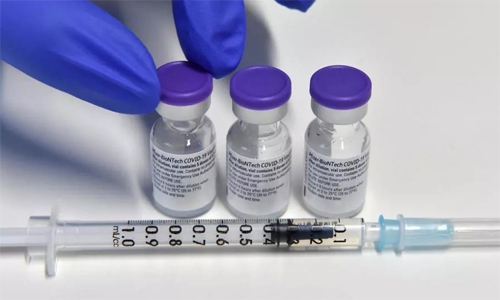‘Join up to speed up’: WHO urges Europe, pharma to collaborate on vaccines
AFP | WHO
The Daily Tribune – www.newsofbahrain.com
Europe and pharma groups must work together to speed up Covid-19 vaccinations and share doses with poorer countries, the head of the European branch of the World Health Organisation said Friday, expressing concern about the spread of virus variants.
"We need to join up to speed up vaccinations," WHO Europe director Hans Kluge told AFP in an interview, as Europe bids to overcome a slow start to its vaccination campaign amid tensions between Brussels and vaccine manufacturers.
Kluge said competing pharmaceutical companies must join efforts to "drastically increase production capacity".
In the European Union, just 2.5% of the population has received a first vaccine dose, though announcements by several laboratories of increased vaccine deliveries have raised hopes of an acceleration.
"We have to be prepared" for new problematic mutations of the virus, he warned, calling on countries to expand their genomic sequencing capacity.
He added: "It's a cruel reminder that the virus still has the upper hand on the human being."
Tunnel 'a little bit longer'
Of the 53 countries in the WHO's European region – which includes several countries in Central Asia – 37 have reported cases of the British variant and 17 have registered cases of the South African variant.
While the fight against the pandemic now appears more challenging than in December when the first vaccines became available, Kluge remained optimistic.
"I'll be honest, I think that the tunnel is a little bit longer than what I thought at the end of December, but it's going to be manageable, more preventable this year," he said.
"'The' solution or 'the' strategy doesn't exist. We have to get better at what we do and we are getting better," Kluge added.
He reiterated the WHO's call for rich countries to show solidarity toward poor nations unable to buy vaccines, urging wealthy ones to share their doses after having inoculated a portion of their own population.
Kluge suggested wealthier nations share their vaccines once they have inoculated "elderly people, health care workers and people with comorbidity" – without waiting to cross the 70% threshold required to attain herd immunity.
"If they hit 20% of their population, maybe that's the moment that they can already start to share some vaccines," he said.
No to 'vaccination passports'
The milestone of 100 million vaccine doses administered was passed on Tuesday, with 65 per cent of jabs given in high-income countries, according to World Bank criteria.
In a bid to combat "vaccine nationalism", the WHO has set up Covax, a global inoculation-sharing initiative to help poor countries.
"We know that in the EU, Canada, UK, US, they all ordered and made deals for four to nine times more doses than they need. So my point here is, don't wait until you have 70% of the population (vaccinated) to share with the Balkans, to share with central Asia, Africa," Kluge said.
While the WHO is in favour of countries issuing vaccination certificates, Kluge was opposed to the idea of "vaccination passports" required for travel.
"We certainly don't want to have a situation where there are so-called vaccine passports, that's something that we are definitely not subscribing to because it will increase inequities," he explained.
Related Posts

